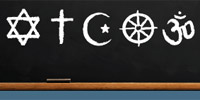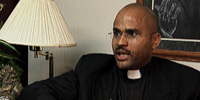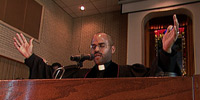In This Episode << SLIDE LEFT TO SEE ADDITIONAL SEGMENTS
U.S. Religion Survey
BOB ABERNETHY, anchor: We have an analysis now of the Pew Forum survey on American religious beliefs. As other surveys have also found, including one done by this program in 2002, Pew reported that 70 percent of American religious believers said many religious traditions — not just their own — can lead to eternal life. Scott Appleby is a professor of history and director of the Kroc Institute at the University of Notre Dame. He joins us from San Diego. Dr. Appleby, welcome.
Dr. SCOTT APPLEBY (Professor of History and Director, Kroc Institute, University of Notre Dame): Hello, Bob.
ABERNETHY: Whatever happened to the conviction that my way or your way is the only way to salvation?
Dr. APPLEBY: Well, for one thing, Bob, we’re a more tolerant society in the last generation or so than we’ve been in the past. Part of that comes from familiarity. Foreign religions — Hinduism, Buddhism, even Judaism to some degree — used to be seen as exotic or foreign. Because of media and communications, they’re right next door. They’re part of our culture. They’re more familiar. That breeds tolerance, acceptance. We also have taught our children in the past generation that discrimination is wrong: racial discrimination, discrimination on the basis of gender, on sexual orientation. That’s a deep value in the culture. So for someone to come and say “this way is the only way” rubs against the grain of contemporary culture.
ABERNETHY: But for Christians — let me just speak about Christians for a minute — for Christians traditionally there has been the very clear teaching that the only way to salvation is through Jesus Christ. Now, this poll data seems to say that that doesn’t matter to 70 percent of believers anymore.

Bob Abernethy |
Dr. APPLEBY: And that’s very troubling to religious leaders. Pope Benedict XVI, for example, rails against what he calls “relativism” — precisely this attitude that things are relatively true, that there’s not one capital “T” truth at least that we can know with any definitive kind of knowledge. He thinks this a terrible trend for religion, and he’s not alone. Many evangelical Christians who believe Jesus is the only “Way, the Truth, the Life” are very troubled by anyone attempting to water it down or compare Christianity on an equal footing with other faiths.
ABERNETHY: But the trend has been continuing for many years and probably is going up?

Scott Appleby |
Dr. APPLEBY: Yes. There are deep currents in our culture that I think can sometimes be a bit superficial. We’re familiar with these other traditions, but we trivialize them. We’ve got Babu on “The Simpsons.” He’s the stock Hindu. We have stock Jews and Christians. They’re stereotyped. Also, our tolerance doesn’t necessarily mean that we engage the deep beliefs and convictions and arguments of these traditions. We accept them: Live and let live. That leads to civil relations, which is a good thing. But it doesn’t necessarily lead to wisdom or truth or deep reflection, and that troubles the religions.
ABERNETHY: Scott Appleby of the University of Notre Dame, many thanks.
Dr. APPLEBY: Thank you.






